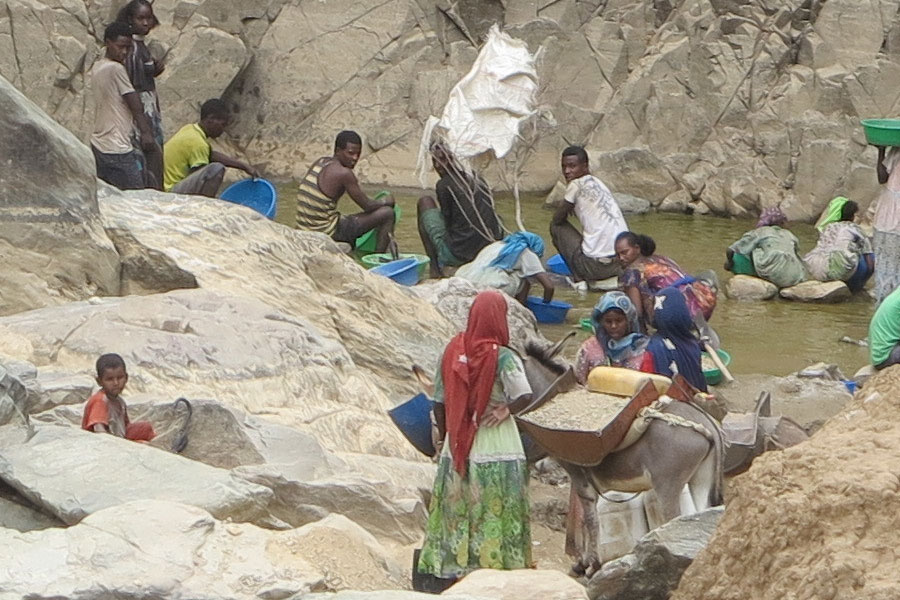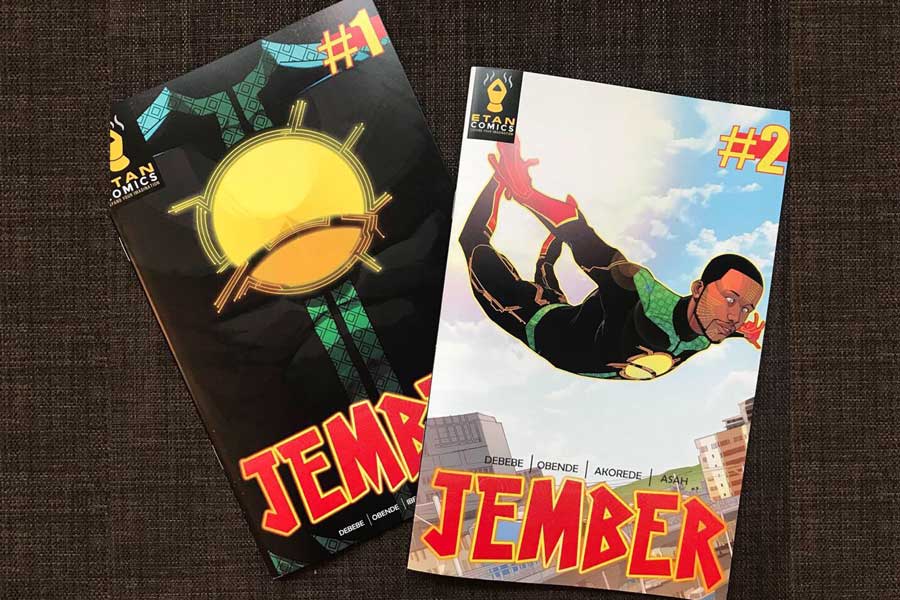
Radar | Feb 25,2023
Jan 11 , 2020
By Ayalew Teshome
For the last several hundred years the question of whether language precedes or is constitutive of human experience has been at the centre of philosophical reflections. The relation between language and thought, the question of whether linguistic diversity is a historical outcome emanating out of a single human experience has been a major philosophical preoccupation going as far back as the 17th century.
Neither have synchronic studies brought language home to its birthplace nor have works so far analysed the texts of the Dakik Estifanos(the views and lives of these religious monks in medieval Ethiopia [1406-1471] dedicated to monastic life and to the study of the scripture) at the level of the existence of signs or established the specific politico-historic conditions that gave rise to the phenomena that we locally describe as samenna work (wax and gold). This article is an attempt to bring language to its birthplace and answer academic questions as old as the science itself; to argue that the subject and the object of both texts are "language" itself; and to argue its tyranny and its limits.
The article can do this by critically examining the form of verbs. Amharic verb stems show interesting distinctive inner principles. The present indicative form is “root plus obligatory reflexive pronoun” as it appears. Without the obligatory reflexive pronoun, it is quite impossible to speak anything like normal Amharic. Without, at every point, specifying the pronoun, there must be this pronoun whenever a number of signs are put together or even when there is a single sign. Representation itself obliges the speaker to refer to it just like English verbs oblige the speaker to refer to time. As we know, without time the world would be silent.
Root plus obligatory reflexive pronoun makes a statement rather than a verb, and the statement is the indispensable condition for all languages; and wherever it does not exist, at least by implication, it is not possible to say that there is language.
Could one speak of a statement if the subject behind the reflexive pronoun had not been articulated, if a surface did not bear its signs, if it had not become embodied in a sense-perceptible element, and if it had not left some trace - if only for an instant - in someone's memory or in some space? Does this not mean Amharic verbs affirm while still in a dictionary? Do they not indicate that they are a discourse of a man who does not merely conceive of nouns but judges them?
The events of the Dakik Estifanos are verbal performances linked at the level of God. If the art of combining the contingent and the sacred, as in wax and gold expressions, declares the death of "God", as Michel Foucault said, since the first wax and gold text specimen appears during the period in which the Estifanosites were active according to Ceruli, these events all must be linked to a fundamental eruption in the Middle Ages that echoes to the present day. The past can no longer be understood in its own terms, because now wax and gold is to be understood in terms of the concerns of the present. This links the subject to those historical transformations surrounding its appearance, its operation in economic structures, social institutions and political behavior. And subjecting them all to the same type of transformation, the analysis creates a knowledge site, internal to Ethiopia’s history, from where the vision of justice and emancipation as both the means and the ends can be possible.
What we now call "man", Foucault argues, had no way of conceptualising its separateness from other creatures until the 19th century. "Humanity," in this account, is barely a couple of centuries old. Before this period, there can be different connections and separations that can be made; the events of the Dakik Estifanos can, then, be deeply connected with what might be called the politics of the self and identity. Identity, beyond doubt, requires the mediation of consciousness, or as Lacan put it: the mirror of language in order to know oneself and the world.
In fact, we Ethiopians are often accused of poor concepts of time.
Is this not the reason for our poverty?
It is a truism that no one questions the fact that time precedes everything created. Time is the limit of things visible and invisible. Time is not a human invention, yet many scholars claim that the foundation of Western civilization is the transformation of the concept of time. Viewed in this sense, the verb is not only the means of expression of thought but enters into its very constitution. Representation is not rooted in a world that gives them meaning, that "constitution" does not mean translating, fabricating a material double that is able, on the external surface, to reproduce thought in its exactitude.
Rather it means the specificity of the language opens itself onto a space of its own, whose internal network gives rise to a social practice such as the one embedded in the popular phrase "yehabesha ketero”, a phrase used to refer to Ethiopian’s consistent failure to keep an appointment. The reflexive pronoun and its relation with language may not only explain how our subjectivity is constituted by forces external to us, but it also explains why we are deeply religious.
We find the wax and gold practice tempting to question: whether the obligatory elements in English and Amharic were evolving in the same direction at some point in the course of history. Or whether local historical events determined the conditions for the possibility of a poetry, which we call wax and gold in Ethiopia and an elaborated time concept in the West. Time is the limit of the existence of signs, not a thing can exist before the time of time itself.
If we describe the organisation of the field of statements where they appear and circulate, we can come up with a logic that might account for the fundamental cause for the pronoun to appear in the first place, explain its historical function, its condition of existence prior to the events of the Dakik Estifanos, as well as in relation to the period during which the first wax and gold text specimen appeared.
Language (langue) and the reflexive pronoun are not at the same level. The two are not equivalent and the reflexive pronoun is the necessary condition for language to exist. Language diversity does not exist without the reflexive pronoun; hence the pronoun rather than the speaking subject is the indispensable condition for signs to exist. Therefore, language begins with the experience of the subject for which the obligatory reflexive pronoun stands.
PUBLISHED ON
Jan 11,2020 [ VOL
20 , NO
1028]


Radar | Feb 25,2023

View From Arada | Jun 15,2019

View From Arada | Nov 29,2020

Sunday with Eden | Nov 23,2024

Commentaries | Jul 13,2019

Fortune News | Aug 07,2021

Radar | Nov 09,2024

Fortune News | Sep 30,2023

Agenda | Jun 05,2021

Fortune News | Sep 30,2023

My Opinion | 132272 Views | Aug 14,2021

My Opinion | 128692 Views | Aug 21,2021

My Opinion | 126600 Views | Sep 10,2021

My Opinion | 124206 Views | Aug 07,2021





Dec 22 , 2024 . By TIZITA SHEWAFERAW
Charged with transforming colossal state-owned enterprises into modern and competitiv...

Aug 18 , 2024 . By AKSAH ITALO
Although predictable Yonas Zerihun's job in the ride-hailing service is not immune to...

Jul 28 , 2024 . By TIZITA SHEWAFERAW
Unhabitual, perhaps too many, Samuel Gebreyohannes, 38, used to occasionally enjoy a couple of beers at breakfast. However, he recently swit...

Jul 13 , 2024 . By AKSAH ITALO
Investors who rely on tractors, trucks, and field vehicles for commuting, transporting commodities, and f...

Jul 12 , 2025
Political leaders and their policy advisors often promise great leaps forward, yet th...

Jul 5 , 2025
Six years ago, Ethiopia was the darling of international liberal commentators. A year...

Jun 28 , 2025
Meseret Damtie, the assertive auditor general, has never been shy about naming names...

Jun 21 , 2025
A well-worn adage says, “Budget is not destiny, but it is direction.” Examining t...

Jul 13 , 2025 . By YITBAREK GETACHEW
The Addis Abeba City Revenue Bureau has introduced a new directive set to reshape how...

Jul 13 , 2025 . By BEZAWIT HULUAGER
Addis Abeba has approved a record 350 billion Br budget for the 2025/26 fiscal year,...

Jul 13 , 2025 . By RUTH BERHANU
The Addis Abeba Revenue Bureau has scrapped a value-added tax (VAT) on unprocessed ve...

Jul 13 , 2025 . By NAHOM AYELE
Federal lawmakers have finally brought closure to a protracted and contentious tax de...